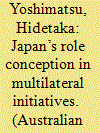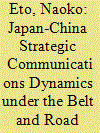| Srl | Item |
| 1 |
ID:
193245


|
|
|
|
|
| Summary/Abstract |
The unequal distribution of power and resources has created conditions for conflict or even war between states. With the United States a declining hegemon and China on the rise, a conflict between these two great powers was bound to erupt. In this regard, the US government noted in the National Security Strategy of 2021 that China is a competitor and a threat to its goals and to its desire to remain the dominant power in the world. One of the factors that have brought China to the position of a challenge and competitor to the US and other powers is the Belt and Road Initiative (BRI). In this paper, C Joshua Thomas and Haans J Freddy throw some light on the great power competition in the context of BRI and examine how the US is leading the counterbalance with its Build Back Better World (B3W). The US and other liberal countries are challenging the BRI by means of the Quadrilateral Security Dialogue (QUAD) and the Free and Open Indo-Pacific (FOIP). What will be the consequences of such a great power competition and what challenges the BRI might face in the future are questions that this paper addresses
|
|
|
|
|
|
|
|
|
|
|
|
|
|
|
|
| 2 |
ID:
158735


|
|
|
|
|
| Summary/Abstract |
This article examines Japan’s role conception in its multilateral commitments to the Asia-Pacific after the global financial crisis in 2008. The Hatoyama government launched an East Asian Community initiative, which aimed to assume a kingmaker role in creating a new order in East Asia. However, the East Asian Community initiative did not develop due to stress on self-reliance and distance from partnership with the USA. The Abe government sought to play a dual role in its major multilateral commitments. On the one hand, the government sought to play a follower role in enhancing the position of the East Asia Summit with an eye to consolidating the US-based institutional framework. On the other, Abe’s new multilateral initiative of the Free and Open Indo-Pacific represented Japan’s kingmaker role in maintaining a free and open maritime regime, and to keep a liberal and open economic regime under the emergence of the Trump administration.
|
|
|
|
|
|
|
|
|
|
|
|
|
|
|
|
| 3 |
ID:
179942


|
|
|
|
|
| Summary/Abstract |
Since the 2000s, the power of international narratives has attracted much attention in China. Under the Xi Jinping administration, the enhancement of "international discourse power" became an explicit policy and a diplomatic goal, closely linked to its Belt and Road Initiative (BRI). BRI, further, overlaps with China's efforts to develop a new concept of "institutional discourse power" as a mechanism to convert the economic gravity of China into political power by enhancing their agenda-setting capability, particularly in emerging rule-making process of the new economy. Such ambition has also shaped the new economic integrative framework between China and developed countries including Japan. Japan, on the other hand, relied on an increasingly inclusive notion of free and open Indo-Pacific (FOIP) to define and promote its relations with both "likeminded countries" and China for the purpose of making the BRI relative. Although Japan and China have agreed on economic cooperation in third countries as a new collaborative scheme in 2018, there remains a gap in their political objectives and strategic communications. This poses a major challenge for China, which hitherto has relied on China-centric narratives, as it can only enhance its identity as a global leading power by accommodating and accepting partially narratives of other major countries, including Indo-Pacific countries.
|
|
|
|
|
|
|
|
|
|
|
|
|
|
|
|
| 4 |
ID:
188853


|
|
|
|
|
| Summary/Abstract |
In light of China’s rise, the Quad coalition has gained momentum in its efforts to maintain a Free and Open Indo-Pacific (FOIP). While scholars have discussed the relevance of Quad, little work has been done to theorize the balancing behaviour of individual Quad countries. This article examines Randall Schweller’s Balance of Interest theory—which emphasizes the underlying ‘profit motives’ in alliance formations—in the Quad coalition. Using Schweller’s typology of States, this article argues, the United States behaves as a status quo lion state, Japan as a lamb state, Australia and India as jackal states, and China as a revisionist wolf state.
|
|
|
|
|
|
|
|
|
|
|
|
|
|
|
|